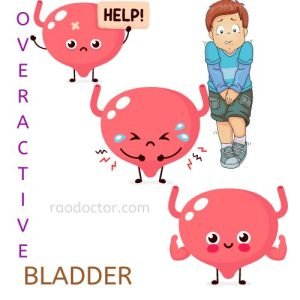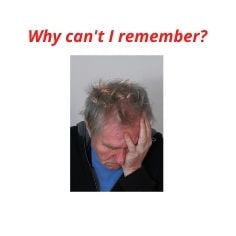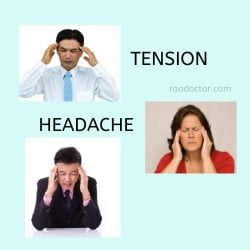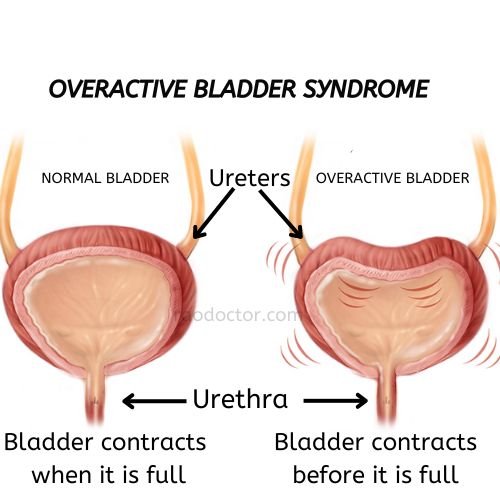
In my last article on Kidney Stones, I made a closing remark that my next article will be on Overactive Bladder. So, here we are now, let’s learn about this annoying condition.
You can also listen to this article here-
Listen to “Overactive Bladder” on Spreaker.There are many things in life that are unpredictable. Sudden changes in our routine, stress, unexpected events, and even certain foods may trigger the symptoms of an overactive bladder — also known as hyperactive bladder syndrome.
A person who has an overactive bladder will experience urinary urgency (the sensation that you need to empty your bladder soon), followed by a quick onset of urination with an inability to hold back until you get to a restroom. These episodes occur frequently and can be quite embarrassing.
These problems usually arise at the most inconvenient times: when you’re out in public or in a personal setting like at home. It can be hard to know what triggers them specifically because they have so many different triggers.
Stress, caffeine, alcohol, and other things seem to increase their likelihood but none of them alone is the specific cause.
Table of Contents
What Is an Overactive Bladder?
There is no real definition of an overactive bladder, and it’s used as a general term to describe different bladder conditions.
One way to understand it is that it’s a problem with your bladder’s ability to function normally. It can be made worse by an infection, certain medications, or other health conditions.
An overactive bladder is a common complaint among older adults, but people of all ages can have it.
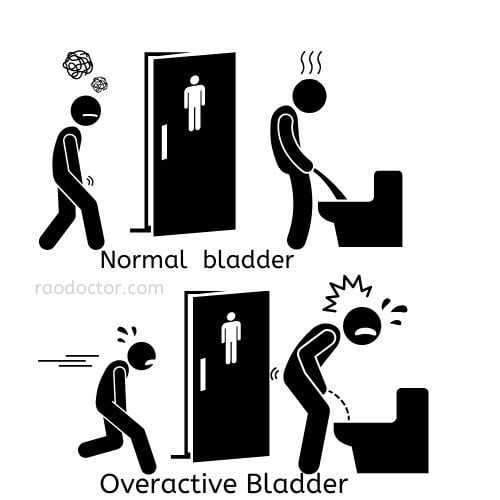
It’s a condition in which the bladder muscle contracts suddenly and involuntarily, causing a person to feel the need to urinate immediately. This often happens several times during the day, which can be a major disruption to daily life.
Causes of Overactive Bladder
Overactive Bladder, or OAB, is a condition where the bladder muscles contract uncontrollably, causing frequent and often urgent urination. It affects many people and is usually a result of a bladder infection or other medical condition such as poor pelvic muscle control.
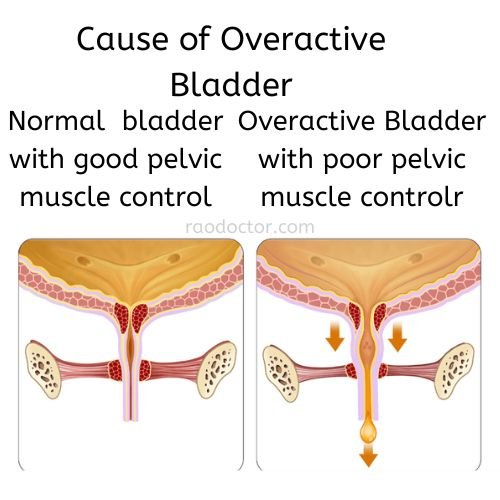
The good news is that there are many treatments available to help bring your OAB symptoms under control. An overactive bladder can be caused by many things, including infections and certain medical conditions.
While many people with OAB have no known cause, it is often treated with medication or other non-invasive treatments including pelvic floor exercises and lifestyle changes.
Hyper Awareness and Urgency
Urinary urgency is the sudden desire to urinate without a feeling of having to go all the way. At times, it can feel like you have to go, but nothing is coming out.
Urgency is caused by a sudden and involuntary spasm of the bladder wall, and the feeling that you need to urinate immediately can be described as an annoying, nagging sensation in the bladder. It is accompanied by an intense urge to urinate, even if your bladder is not full.
If you have an overactive bladder, you may experience urinary urgency and have difficulty waiting to find a bathroom. Urinary urgency may also cause you to feel a strong need to urinate every few hours.
Urinary Incontinence
Urinary incontinence is a condition where your bladder loses control and can’t hold in urine as well as it used to. The two most common types are urge incontinence and stress incontinence.
Urge incontinence-
This occurs when your bladder becomes overactive and unable to hold urine, causing it to contract and release urine unexpectedly.

You may experience this as a sudden and overwhelming urge to urinate, and it is usually accompanied by an uncontrollable urge to empty your bladder as soon as possible.
Urge incontinence can also cause a feeling of urgency to urinate that lasts for several hours, even if your bladder is relatively empty.
Stress incontinence-
This occurs during activities that put pressure on your bladder, such as heavy lifting, coughing, sneezing, laughing, or jumping. When pressure is put on the bladder, urine may leak out of the bladder into the urethra, creating a wet spot on your clothing. You can learn more about the difference between OAB and urinary incontinence aby clicking the link of this article-
https://medium.com/@vasu56deva/urology-cc155f8685b0
Constipation and Painful Bladder Syndrome (BPS)
Painful bladder syndrome (BPS), also known as interstitial cystitis, is a condition that causes painful bladder spasms. The symptoms include frequent urination, pain when urinating, pelvic pain, and pain in the lower back.
These symptoms can make it extremely uncomfortable to go about your daily activities. BPS is often underdiagnosed, but it can be treated with medications, lifestyle changes, and other therapies.
BPS can also cause constipation due to frequent urination. Experts believe that this condition can be managed with a high-fiber diet, probiotics, and other lifestyle changes.
How to Manage Your Symptoms
If you’re living with an overactive bladder, it’s important to keep in mind that it is a treatable condition. With the right approach, you can manage (and even eliminate) your OAB symptoms so that you can get back to living your best life.
Understand what’s triggering your symptoms –
It may not be obvious what is triggering your bladder symptoms, but it’s important to identify your specific trigger(s) so that you can better manage your symptoms.
Keep a symptom journal
Do this to track your symptoms and when they occur. This will help you identify patterns, which in turn will help you discover potential triggers.
Stay hydrated –
Since your bladder is constantly emptying itself, it’s important to stay hydrated. Drinking plenty of water can reduce the amount of urination you experience, which can help reduce the amount of bathroom breaks you need during the day.
Manage stress –
Stress often exacerbates bladder symptoms, so it’s important to find ways to reduce your stress levels.
Exercising, spending time outdoors, and participating in meditation, yoga, or other mindfulness activities can all be helpful in managing stress.
Avoid bladder irritants –
Certain substances can irritate your bladder and make your symptoms worse. Staying away from beverages that make you go often, like coffee, carbonated beverages, and alcohol, especially beer, can cause repeated visits to the washroom.
Talk to your doctor –
If you’re experiencing chronic bladder symptoms, it’s important to talk to your doctor. They can help rule out any serious health conditions and determine the best treatment options for you.
Use a Diaper
In the case of elderly patients with OAB, I usually advise the use of adult diapers while traveling and at home so that they don’t have to worry about visiting the washroom often, especially at night.
Useful resource- Exercises to manage OAB
Medications for OAB-
OAB patients can try several medications for relief from symptoms. Your doctor might prescribe you one or more of these medicines-
- Anticholinergic agents – Anticholinergic agents like oxybutynin, tolterodine and darifenacin are used to treat overactive bladder (OAB). These drugs are also used in other conditions like irritable bowel syndrome (IBS), nocturia, and Parkinson’s disease. Anticholinergic agents work by blocking the action of a chemical called acetylcholine, which constricts the bladder muscles. Drugs available in India-
- Tropan,
- Darifen,
- Roliten
- Tricyclic antidepressants – Amitriptyline, clomipramine, and imipramine are tricyclic antidepressants that are used to treat OAB. These drugs work by blocking the reuptake of serotonin and norepinephrine in the bladder. They help in relaxing the bladder muscles, thus treating OAB. Drugs available in India-
- Amitryn,
- Clonil,
- Depsonil
- Alpha-agonists – alpha-agonists like tamsulosin, alfuzosin, and silodosin are used for the treatment of benign prostate hyperplasia (BPH), hypertension, and OAB. Alpha-agonists work by relaxing the smooth muscles of the bladder, prostate, and urethra. They are thus helpful in treating OAB. Drugs available in India-
- Veltam, Uripro, Urimax
- Alfoo,
- Silodal
- Antispasmodic agents – Antispasmodic agents like belladonna alkaloids, papaverine, and flavoxate are used for the treatment of overactive bladder (OAB). These drugs help in relaxing the bladder muscles by blocking calcium channels and decreasing the sensitivity to bladder stretch. Drugs available in India-
- Urispas,
- Urikind
Kindly note that all these drugs/medicines should be bought strictly by using your doctor’s prescription.
Useful resources-
Conclusion
There are many things in life that are unpredictable. Sudden changes in our routine, stress, unexpected events, and even certain foods may trigger the symptoms of an overactive bladder.
A person who has an overactive bladder will experience urinary urgency followed by a quick onset of urination with an inability to hold back until you get to a restroom. These problems usually arise at the most inconvenient times: when you’re out in public or in a personal setting like at home.
What triggers them specifically is that they have so many different triggers. Keep in mind that it is a treatable condition.
With the right approach, you can manage (and even eliminate) your OAB symptoms so that you can get back to living your best life.
Final words-
I hope this article was useful to you. If you feel so, how about sharing it on your social media accounts/groups? Click below to share directly on Twitter-
How to Manage Overactive Bladder Syndrome and Live a Better Quality of Life Share on XDisclosure-
Some of the links used in this article are affiliate links. i.e., if you sign up for their paid program or make a purchase, I will get a commission, at no extra cost to you. Please be rest assured that I only recommend software/ products I genuinely believe in, and trust to be good for you too.

